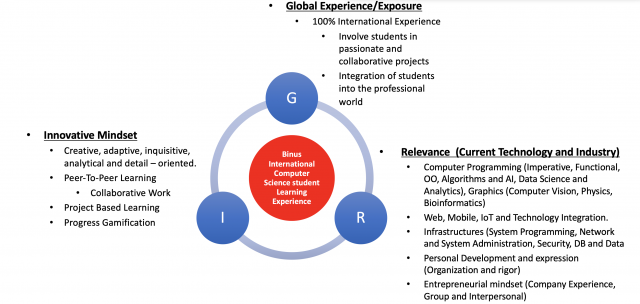About Computer Science Program
Program Description
The Computer Science Program has been dedicated to offer the highest standard of computer science education since its establishment in 2001. The Program has a range of focused courses, called stream, at the undergraduate level. Each stream is aimed to build not only a strong conceptual knowledge in computer science, but also well-defined IT industry skill-sets, including General Computer Science, and Games Technology. To ensure that the skill-sets match with industry requirements, the school adopts an industry-academic program and embeds this program in different courses in the defined streams. For instance, we embed the CEH (Certified Ethical Hacker) curriculum in our course.
The Program is not only concerned with the academic quality of the program, but it also prepares students for their future careers by providing them with opportunities to obtain professional certifications and with work experience in internships with industry and managed internship programs. While in the internship with industry program, students spend a certain period working full time at a company site, in the managed internship the students work on the project brought by a company to the school, at the school site.
Vision
A world class study program by providing excellent educational experiences in computer science, fostering and empowering the society in building and serving the nation.
Mission
- Educating students to effectively apply their educational experiences in computer science to solve real-world problems.
- Preparing our graduates to develop exemplary soft skills & technical skills required as ICT professionals, leaders and entrepreneurs in global market.
- Promoting high impact research that contributes to the nation.
- Fostering BINUSIAN as lifelong learners through self-enrichment.
- Empowering BINUSIAN to continuously improve society’s quality of life.
Program Objectives
- To produce graduates who will become successful professionals in ICT fields.
- To produce graduates who will obtain employment in global companies or become entrepreneurs.
- To produce graduates who will obtain professional certification or continue their study to the postgraduate level.
- To produce reputable professionals with the skills to develop creative and impactful software products and services, including but not limited to computer networks and security and games technology.
- To produce reputable professionals with a solid foundation of mathematical, algorithms, and principles related to computing that will be needed in problem solving practice.
- To equip graduates with the six (6) key skills (self-management, planning and organizing, team work, problem solving, decision making, initiative and enterprise), adept knowledge and use of a foreign language as well as using information technology and to be of value in the workplace and society.
Student Outcomes
After successful completion of the 4-year program, students are expected to be able to:
- Able to analyze a complex computing problem and to apply principles of computing and other relevant disciplines to identify solutions.
- Able to design, implement, and evaluate a computing-based solution to meet a given set of computing requirements in the context of computer science
- Able to communicate effectively in a variety of professional contexts.
- Able to recognize professional responsibilities and make informed judgments in computing practice based on legal and ethical principles.
- Able to function effectively as a member or leader of a team engaged in activities appropriate to computer science.
- Able to apply computer science theory and software development fundamentals to produce computing-based solutions.
- Able to apply the skills and knowledge needed to design and implement various computer networking environments using different security techniques and routing theories to produce secured and robust networks.
- Able to apply the necessary skills to design and develop interactive (i.e. games, simulation, etc.) applications by combining technology with creative art and design concepts to produce an exceptional interactive application that is able to run in multi-platform environments.
- Able to apply the 6 key skills (self-management, planning and organizing, teamwork, problem solving, decision making, initiative and enterprise) and a foreign language as well as using information technology and to be of value in the workplace and society.
- Able to apply interdisciplinary knowledge and skills in developing alternative solutions for problem-solving.
Graduate Competencies
Upon successful completion of this 4-year program, students are expected to be able to:
- Apply design and development principles in the construction of software systems of varying complexity.
- Apply knowledge of computing and mathematics appropriate to the discipline.
- Identify, define and analyse computing problems and requirements appropriate for solution.
- Design, develop and evaluate a computer-based system, process, component, or program to meet desired needs, in compliance with global standards.
- Demonstrate effective communications skills (verbal and written) to international audience.
- Comprehend and apply knowledge of professional, ethical and social responsibilities.
- Comprehend and analyse the impact of computing on individuals, organizations and society, including ethical, legal, security and global policy issues.
- Demonstrate an understanding of the needs and engagement in continuous improvement, including professional development.
- Apply current techniques, skills, and tools in computing to creatively design and produce innovative computing practices.


